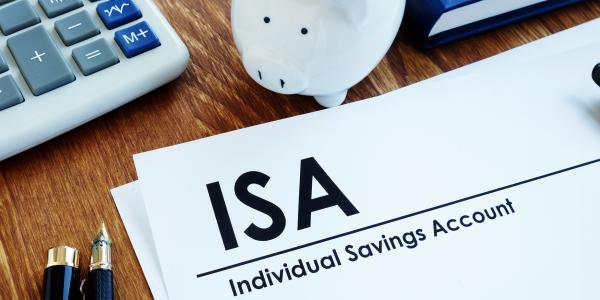Individual savings accounts (ISAs)
Individual savings accounts (ISAs) are a form of savings that has tax advantages. Income tax and capital gains tax can be saved if you invest in ISAs, but they are still counted in your estate for inheritance tax.

Content on this page:
ISAs and their tax benefits
You can save income tax and capital gains tax free with individual savings accounts (ISAs). This means that:
- the income your ISA generates (normally interest or dividends) is exempt from income tax
- any gains you make on disposal of assets held within an ISA are not chargeable to capital gains tax (but equally any losses you make are not available to be offset against capital gains on assets disposed of outside of an ISA)
ISAs are available to individuals who are resident in the UK. There are several different types of ISA available, as described in more detail below.
ISA income is not taxable, so it does not count towards the personal savings allowance or the dividend allowance and you do not need to tell HMRC about it.
Across all types of ISA (except junior ISAs), the maximum you can put in, during 2024/25, is £20,000.
Prior to 6 April 2024, you could only subscribe (pay into) one ISA of each type per tax year. From 6 April 2024, this restriction is removed for ISAs except the lifetime ISA and junior ISA. For details, see GOV.UK.
Cash ISAs
Cash ISAs are relatively straightforward accounts on which you can earn tax-free interest on your cash savings. The minimum age to open a cash ISA is increasing from 16 to 18 from 6 April 2024, with transitional arrangements applying from 6 April 2024 to 5 April 2026. For details, see GOV.UK.
Withdrawals
You can withdraw money from cash ISAs whenever you like without a penalty from the government. However, if you have a ‘fixed-term’ cash ISA, then you will need to check to see whether you can access funds before the end of the fixed term. Even if you can, your ISA provider may charge a penalty for an early withdrawal.
Flexibility
Cash ISAs may be ‘flexible’ or ‘not flexible’. If the ISA is flexible, then you can withdraw money from an ISA and return it in the same tax year without the funds counting towards the £20,000 subscription limit when they are returned. Not all ISAs are flexible, so you should check with your provider.
Stocks and shares ISAs
You need to be 18 or over to have a stocks and shares ISA. The dividends you receive from the stocks and shares in the ISA are not taxable.
With stocks and shares ISAs, you can sell the assets at any time with no penalty and there is no minimum length of time you need to hold them. There is no capital gains tax on selling the investments within a stocks and shares ISA. Equally, if you sell the investments at a loss (that is, for less than they were bought for), you cannot get tax relief for the loss.
However, unlike flexible cash ISAs, if you take the sale proceeds out of the account and then re-invest these funds, this will count towards your ISA subscription allowance.
Innovative finance ISAs
Innovative finance ISAs allow individuals aged over 18 to invest in peer-to-peer loans rather than cash or stocks and shares.
You may not be able to easily access funds held in an innovative finance ISA if they are allocated to a loan. You should check with the provider. A fee may be payable.
Like stocks and shares ISAs, if you withdraw money from the ISA then re-invest these funds, then it will count towards your ISA subscription allowance.
Lifetime ISA
You can open a lifetime ISA if you are aged 18 or over but under 40. Savings can be added to them up to the age of 50. They aim to help you build a deposit for your first home or save for retirement (usually drawing on the savings from age 60).
The government pays a tax-free bonus of £1 for every £4 saved into a lifetime ISA, so somebody who saves the maximum £4,000 a year will get an extra £1,000. If you are a basic rate taxpayer, this is the same amount as you might get in tax relief if you put £4,000 into a relief-at-source pension.
If you wish to withdraw lifetime ISA funds other than to buy your first home or after you have reached age 60, or if you are terminally ill, then you must normally pay a penalty equal to 25% of the amount withdrawn. This can mean that you get back less than you invested.
Age restriction
Note also the age restrictions on lifetime ISAs. If you opened one before the age of 40, you can keep saving up to age 50. But if you are now aged 40 or over, you will not be able to open a new lifetime ISA. If you withdraw funds, you might therefore want to consider keeping a lifetime ISA open if you might want to invest in it in the future. Check with your provider if you can keep it open – even if with a small amount left in the account.
Interaction with other ISA savings
The £4,000 limit for the lifetime ISA, if used, forms part of your overall £20,000 annual ISA limit.
Help-to-Buy ISAs
Help-to-Buy ISAs were introduced from 1 December 2015 and could be opened until 30 November 2019. They are a type of ISA designed to help first-time buyers save up for a deposit for their new home with the government adding a tax-free bonus of up to 25% to all money saved (provided you save a minimum of £1,600, up to a maximum bonus of £3,000). The maximum monthly deposit is £200 each calendar month. It was possible to deposit an additional £1,000 when the account was first opened.
If you have a help-to-buy ISA, you can transfer those savings into a lifetime ISA or you can continue to save into both. However, you can only use the bonus from one of the ISAs to buy a house. Furthermore, if you now transfer help-to-buy ISA savings into a lifetime ISA, the amount will count towards the £4,000 contribution limit.
You can access funds from a help-to-buy ISA without paying a government penalty on withdrawal. However, note that you may not be able to put the money back in – monthly deposits are limited to £200, regardless of whether you have made a withdrawal. Taking money out may therefore affect the bonus which can be built up. If you take all the money out, you will not be able to open a new one as the scheme closed on 30 November 2019. Note, however, that if you meet the criteria, you might be able to open a lifetime ISA instead (see above).
Junior ISAs
There are also junior cash ISAs and junior stocks and shares ISAs for children under 18 years old. A child can have both types of junior ISA, provided they do not exceed the annual junior ISA allowance (£9,000 for 2024/25).
Accessing funds in a Junior ISA
The money in either type of Junior ISA is not accessible until the child is 18, other than on terminal illness or death of the child.
Junior ISAs and trust registration
For information about how savings for children are treated for Trust registration service purposes, see our separate guidance.
Child trust funds
If you have a child trust fund which has matured, you can transfer this into an ISA without reducing your annual ISA subscription limit.
Means-tested benefits
If you are interested in opening an ISA, interactions with means-tested benefits should be considered. Unlike saving into a pension, money saved in ISAs is counted as capital and can affect a claim to benefits like universal credit.
When the account holder dies
Please note that special rules apply where your spouse or civil partner dies and they had ISA holdings at their date of death.
More information
When considering a new investment, make sure you understand when you can take your money out and for what purpose and whether the investment is suitable for your circumstances. Consider seeking financial advice – the government’s MoneyHelper website gives guidance on finding an adviser.
Government information on ISAs can be found on GOV.UK.



